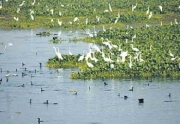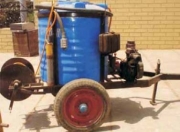/regions/political
Political
Approach paper on water quality issues in islands – Andaman & Nicobar and Lakshadweep by Central Ground Water Board
Posted on 10 Dec, 2010 09:18 PMThis approach paper by the CGWB on water quality issues in islands (Andaman & Nicobar and Lakshadweep) includes a detailed and comprehensive account of the basic information pertaining to each group of islands separately such as administrative set-up, population, climate and also the technical aspects like geomorphology, geological and hydrogeological conditions.
People's initiative in water - Olavanna village in Kerala (India) - Reclaiming public lives - Transnational Institute
Posted on 10 Dec, 2010 06:12 PMThis chapter from the book 'Reclaiming Public Lives' by Transnational Institute describes the case of a small village in the state of Kerala, India, which faced an acute drinking water crisis and describes how people’s initiative, together with the involvement of the local panchayat and the support of the state government, could successfully address the issue of scarce drinking water in the village.
International Symposium on “System Intensification towards Food & Environmental Security”, CWSS, BCKV, Nadia, West Bengal
Posted on 10 Dec, 2010 05:17 PM 
Delhi Sustainable Development Summit (DSDS) 2011, TERI, New Delhi
Posted on 10 Dec, 2010 03:41 PMDelhi Sustainable Development Summit (DSDS) 2011
Theme: "Tapping Local Initiatives and Tackling Global Inertia"
Workshop on developing a groundwater policy for the state of Uttar Pradesh organised by Janhit Foundation
Posted on 10 Dec, 2010 12:04 PMForwarded to the portal by: Janhit Foundation
In the context of the proposed groundwater regulation for Uttar Pradesh state, Janhit Foundation is organising a dialogue through a workshop to discuss challenges with the concerned stakeholders, so that the final policy/bill when prepared and implemented, can benefit the people of Uttar Pradesh.
The Wetlands (Conservation and Management) Rules by Ministry of Environment and Forests (2010)
Posted on 10 Dec, 2010 07:27 AM The Wetlands (Conservation and Management) Rules was notified in December 2010 by the Ministry of Environment and Forests to ensure better conservation and management and to prevent degradation of existing wetlands in India. Wetlands are critical for human development and wellbeing, especially in India where a large number of people are dependent on them for drinking water, food and livelihood. Despite their immense importance, wetlands are one of the most degraded ecosystems globally.
The Wetlands (Conservation and Management) Rules was notified in December 2010 by the Ministry of Environment and Forests to ensure better conservation and management and to prevent degradation of existing wetlands in India. Wetlands are critical for human development and wellbeing, especially in India where a large number of people are dependent on them for drinking water, food and livelihood. Despite their immense importance, wetlands are one of the most degraded ecosystems globally.
Farm Innovators – A compilation by the Indian Council of Agricultural Research (2010)
Posted on 09 Dec, 2010 09:23 PM This publication by ICAR on “Farm Innovators-2010” brings in a paradigm shift towards participatory technology development. Apart from innovations and scientific package of practices developed and transferred from R&D institutes, innovations in the form of grassroot level technologies and methodologies developed by some of the innovative farmers and rural youth have also been accepted across the system.
This publication by ICAR on “Farm Innovators-2010” brings in a paradigm shift towards participatory technology development. Apart from innovations and scientific package of practices developed and transferred from R&D institutes, innovations in the form of grassroot level technologies and methodologies developed by some of the innovative farmers and rural youth have also been accepted across the system.
Community-Led Total Sanitation (CLTS) Newsletter for December 2010 : "82% rural India still lacks basic amenities"
Posted on 09 Dec, 2010 02:02 PMArticle and Image Courtesy: Community Led Total Sanitation (CLTS)
 Community-Led Total Sanitation (CLTS) is an innovative methodology for mobilising communities to completely eliminate open defecation (OD).
Community-Led Total Sanitation (CLTS) is an innovative methodology for mobilising communities to completely eliminate open defecation (OD).
Wildlife Wetlands Photography Contest & Young Environmentalists Programme
Posted on 09 Dec, 2010 10:48 AMWildlife Wetlands Photography Contest by WWF & Young Environmentalists Programme in association with Meluha-The Ferns ecotel, Hiranandani Gardens Powai, Mumbai-400076 on 2nd February 2011.
World Wetlands Day Photography Submissions
A brand new photography international competition is here, the WWF & YEPT in association with Meluha-The Ferns ecotel awards celebrates and recognizes the talents of photographers of all nationalities highlighting the great wealth and diversity of wetlands and wildlife on Planet Earth.
On the brink: Water governance in the Yamuna river basin in Haryana
Posted on 08 Dec, 2010 10:07 PMThis study attempts to develop a case study of the Western Yamuna Canal Command in Haryana with the purpose of developing a general picture of the institutional environment and arrangements related to water resource development and use in the State of Haryana. It is based on a review of water law, policy and administration and helps draw conclusions on whether the existing governance systems are meeting the current needs and suggests alternate options. The study has attempted to test the following hypothesis –